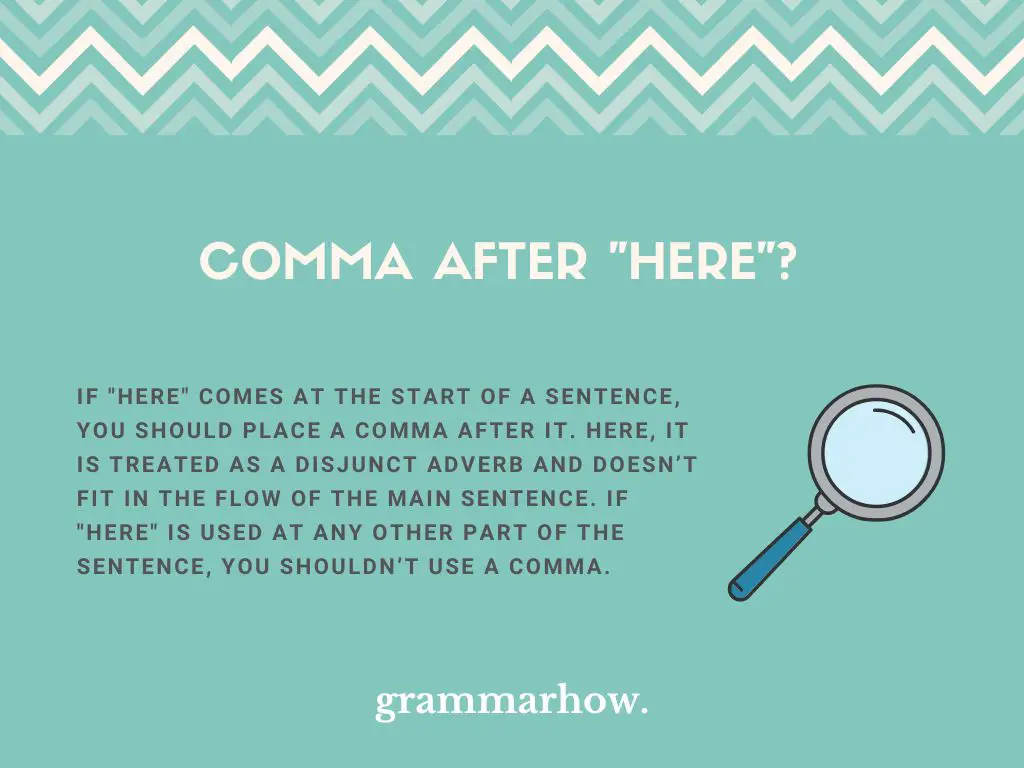Knowing how to use commas correctly is a big part of writing in English. This article will explore where to place a comma with the word “here.” There are only a few places where one is necessary.
Comma after “Here”?
If “here” comes at the start of a sentence, you should place a comma after it. Here, it is treated as a disjunct adverb and doesn’t fit in the flow of the main sentence. If “here” is used at any other part of the sentence, you shouldn’t use a comma.

Here’s a quick example to show you how “here” might look with a comma:
- Here, I found the way to go.
As you can see, “here” comes at the start of the sentence, but it does not fit the flow. A comma is required after “here” to ensure that the sentence makes grammatical sense.
You might also find the sentence is written like this:
- I found the way to go here.
This time, “here” is put at the end of the sentence. The two sentences in these examples are identical, but “here” changes positions. When “here” comes at the end of the sentence, no comma is required before or after it.
Comma after “Here” at the Beginning of a Sentence?
You should place a comma after “here” at the beginning of a sentence. However, some people argue that the comma does not add any meaning to the sentence, as “here” is a short introductory expression. It is correct to include a comma, but it is acceptable to leave it out.
The following examples will show you how “here” works with and without a comma:
- Here, you will find the answers.
- Here you will find the answers.
Officially, the comma is used to segment the sentence. It helps to break up the flow to show that “here” is an introductory adverb. It modifies the whole clause “you will find the answers.”
You may sometimes find “here” without the comma, though. It’s used like this when you want to skip straight into the second clause without worrying about the disjunct adverb.
When to Use Comma after “Here”
You might benefit from a few more examples to show you how a comma comes after “here:”
- Here, you will find most of what you’re looking for. Hopefully, you don’t require anything else.
- Here, I found the answers to the questions. I hope you might be able to do the same.
- Here, there were a few other people that agreed with me. I always knew that I belonged here.
- Here, let me help you with that. I should be able to give you a better sensation.
- Here, the answers made themselves known to me. It was a spiritual awakening, to say the least.
You may also find that a comma comes after “here” when it comes at the end of a clause. This is only true when a coordinating conjunction like “and” or “but” comes straight after “here.”
- I will not be here, and I will not be there.
- I told you to be here, but you are not here.
- They mentioned they would be here, but I could not see them.
This rule is not specific to “here,” but it is still something that allows for a comma to come after it.
When to Not Use Comma after “Here”
You might benefit from seeing some examples of how “here” works without a comma. It’s much more common to use “here” as a noun without a comma, as these examples will demonstrate.
- I will not be here later, so you will have to find someone else to cover for me.
- Why are we here again? I cannot figure out the reason behind any of these decisions.
- It’s not supposed to be over here. You’re looking in the wrong place, you imbecile.
- I told you they’d be here! They’re always happy to be here and help when we need them.
- It’s neither here nor there. Trust me. You’ll be better off just leaving these things as they are.
Final Thoughts
“Here” only requires a comma when it comes at the start of a sentence and breaks up the flow of the sentence. In any other position, you do not need to include a comma because “here” is a regular noun that describes a place.
